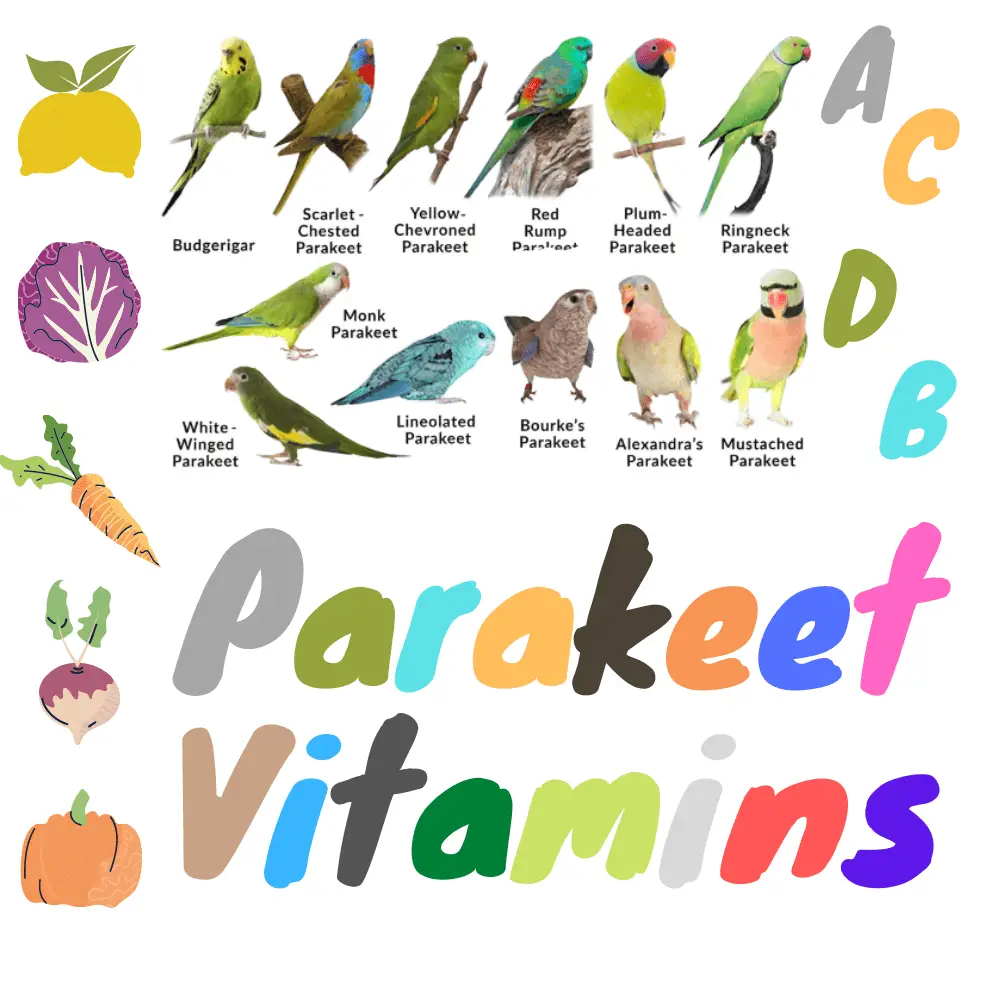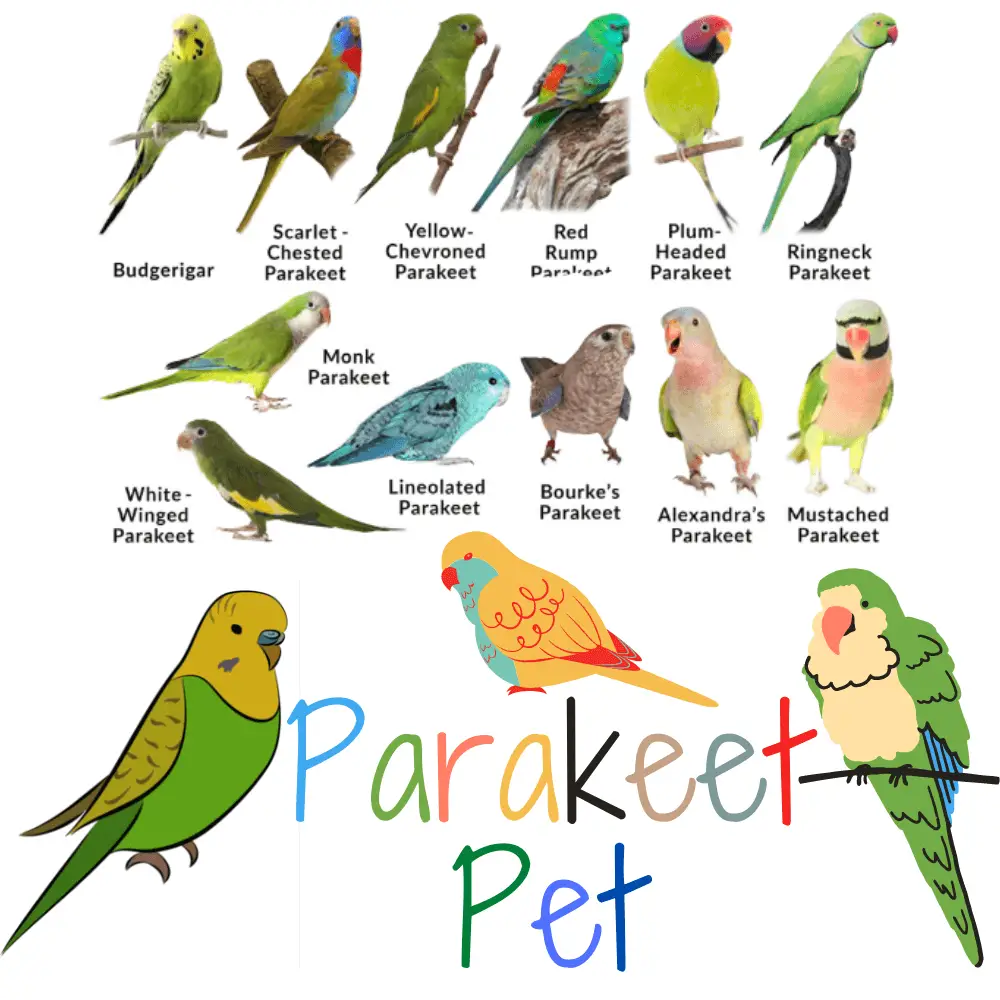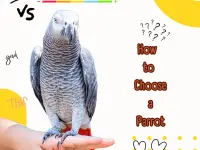
Owners of parakeets, parrots, have a great responsibility to their pets and should always be up to date about Parakeet vitamins. This applies to their observance, for example, the size of their cage, that they have enough room to fly freely, that they are not kept alone, and that they have a clean cage.
Their diet is another important point as well and should not be taken lightly. It is not enough to feed them only with cheap bird food from the supermarket. Birds need different Natural Vitamins to stay healthy and feel good. This article will tell you what types of vitamins your bird needs.
What happens if a bird does not have enough vitamins at all or not enough?
 Birds are prone to vitamin deficiencies, which can be fatal in the worst case. Vitamin A, D (often with calcium deficiency) and B deficiency are the most common, but many other vitamins need to be provided as well. A deficiency occurs if a bird does not ingest enough vitamins through its food.
Birds are prone to vitamin deficiencies, which can be fatal in the worst case. Vitamin A, D (often with calcium deficiency) and B deficiency are the most common, but many other vitamins need to be provided as well. A deficiency occurs if a bird does not ingest enough vitamins through its food.
Vitamin A deficiency
Birds suffering from vitamin A deficiency are often defenseless against diseases because their immune system is significantly weakened. In addition, it can be disastrous for reproduction, bone growth, and the respiratory tract. If the deficiency is strong enough, your bird may suffer from a cold or have difficulty breathing. Parrots often suffer from different types of fungal infections, for example, aspergillosis.
Vitamin D deficiency
Vitamin D is important for the bones of birds, so in case of deficiency, the skeleton can be damaged. It is therefore important for them to have enough vitamin D and enough sunlight, how the vitamin can be produced.
Vitamin B and E deficiency
A deficiency of these two vitamins can lead to cramps. Different types of neurological failures can also occur, which can lead the bird to paralysis.
How to recognize a vitamin deficiency
Bird owners do not know if their pets are getting enough vitamins or not. There are symptoms, on which you can rely to recognize a vitamin deficiency.
Vous pouvez les voir dans ce tableau :
| Type of impairment | Typical symptoms |
| Vitamin A deficiency
|
|
| Vitamin D, E or selenium deficiency |
|
| Vitamin D or calcium deficiency |
|
How to prevent vitamin deficiency
It is important to constantly provide important vitamins to your bird so that a deficiency can not occur. You can do this by providing a balanced diet containing only high-quality food. The cage should be placed in a sunny place, and your bird should have enough space.
When choosing the food you should check that it has been specially customized for your bird species. There are specialized feeds for parakeets, parrots, and so on.
In addition to food, there are other options for providing vitamins to your bird, for example, specialized calcium stones that should be freely accessible inside the bird’s cage. The bird mouron in your garden also contains many important vitamins.
Presentation of vitamins and where to find them
Vitamins are essential for your bird’s health and should be adequately fed at all times. Most birds cannot produce vitamin C and D on their own.
This means that the other vitamins must be ingested through food. These can be divided into water-soluble and fat-soluble substances. How much and what kind of vitamins are needed is species-dependent, so you need to inform yourself what vitamins should be absorbed and in what quantities, since not only too few vitamins are dangerous, but too much is also dangerous.
A higher amount is needed when birds are still growing or incubating, so feeding them with synthetic vitamins makes sense in this kind of situation.
Fat-soluble vitamins
Vitamin A
Vitamin A is only found in foods of animal origin, so your birds can only ingest it by feeding on chicken egg yolks. However, many plants contain the so-called provitamin A or carotene. From these elements, your bird can produce vitamin A itself.
Vitamin d
To be exact, it is the group of vitamin D, consisting of D2, D3, and provitamin 7-dehydrocholesterol, which is also known as the precursor of good cholesterol. This turns under the skin into pre-vitamin D3 and vitamin D3. For this process, UV light is very important.
Vitamin e
Birds usually need more vitamin E than mammals. This vitamin is stored in the lungs, liver, fatty tissue, and spleen. There are eight types of vitamin E, but only alpha-tocopherol is important for birds.
Vitamin k
Vitamin K comes in the form of K1 and K2. K2 is produced in the intestines of birds by microorganisms and is expelled by bird feces. The K1 must be provided by an external source. This vitamin is stored in the liver and is essential for blood clotting.
Water-soluble vitamins
Water-soluble vitamins cannot be stored by your birds, so there is no risk of overdose. That is why it is important to constantly provide these vitamins in order to prevent a possible deficiency.
Vitamin B1
Vitamin B1 is particularly sensitive and is easily destroyed by too much light, heat, or air.
Vitamin B2
Vitamin B2 is also known as the growth vitamin and is part of many different enzymes. In addition, vitamin B2 is responsible for the construction and dismantling of fatty acids.
Vitamin C
Vitamin C is contained in many plants, fruits, and bird food and must be provided at a satisfactory level. If your bird is sick or stressed, you should especially check the vitamin C levels of its diet or support it by adding synthetic vitamin compounds.
Which products contain vitamins?
The following table offers a good overview of the main vitamins and in which products to find them if you can provide your bird adequately
| Vitamin | What food does it contain? |
| Vitamin A
|
|
| Vitamine D
|
|
| Vitamine E
|
|
| Vitamine K |
|
| Vitamine B1
|
|
| Vitamine B2
|
|
| Vitamine C |
|
Les vitamines sont nécessaires pour toutes ces raisons :
Vitamine A:
- protection de la peau
- protection des muqueuses
- favoriser la croissance (une forte dose de vitamine A est nécessaire)
Vitamine D
- réglemente un métabolisme de calcium-phosphate
- conserve une structure osseuse
- important pour la culture des œufs
- empêche la fixation de l’oeuf
Vitamine E
- protège les vitamines liposolubles
- protège les acides gras insaturés
- améliore l’effet de la vitamine A
- important pour les muscles
Vitamine B1
- important pour un métabolisme des glucides
- important pour le système nerveux
Vitamin B2
- important for growth
- important for feathers
Vitamin C
- strengthens the immune system
- important when the bird is sick
- important when the bird is stressed
- influences cellular respiration
- influences hormonal balance
- important for bone growth
- important for the formation of blood
What to do in case of vitamin deficiency
If your bird suffers from vitamin deficiency, as indicated above, you need to react promptly and quickly. It depends on how advanced the symptoms are, and therefore how great the deficiency is. Lack of vitamins is now possible for the bird. Depending on the deficiency, your veterinarian will inject the missing vitamins directly at a high dose or simply into their diet via food or water.
It is also important to analyze why the gap appeared, so you can adjust the diet of your bird. You should control the vitamins administered, as an overdose can also be detrimental to his health.
In addition, the symptoms are studied and treated. The veterinarian can, for example, inject a remedy for cramps and stabilize the bird by applying various infusions.
How you keep your bird, is also important information for your veterinarian. Vitamin D deficiency occurs especially when they don’t get enough UV light. It is important to know that direct sunlight is needed, UV light is destroyed by windows. For this reason, birds need to be placed outside on the balcony or garden. If a vitamin D deficiency occurs it is important to place the cage differently. If it does not get enough sunlight, the bird’s body cannot produce vitamin D by building its preliminary stage.
What is the prognosis for an already existing vitamin deficiency?
What is the health of your bird when there is an already existing deficit? It depends on the deficiency itself and to what extent it has already progressed. If your bird suffers from vitamin A deficiency, it can often be treated by adjusting Parrot nutrition and Diet, the prognosis is positive in this case.
This is also applicable to a calcium or vitamin D deficiency. However, this is only the case if the deficiencies are detected early enough. If the parathyroid is already affected, the prognosis is much worse.
A vitamin B or E deficiency is also very harmful because of the damage to the nerve cells of birds, leading to neurological problems.
Ask your veterinarian
As soon as you detect a deficiency in your bird, it’s important to see the Parrot vet immediately so they can examine and treat – or detect a false alarm if you’re lucky.
It is obvious that the sooner a vitamin deficiency is detected, the better the chances are to avoid all the consequences and do something against it, your bird will be safe and sound quickly and will be able to enjoy a healthy and happy life.
All about vitamin deficiency in birds
SOURCE:Denny the Budgie




















